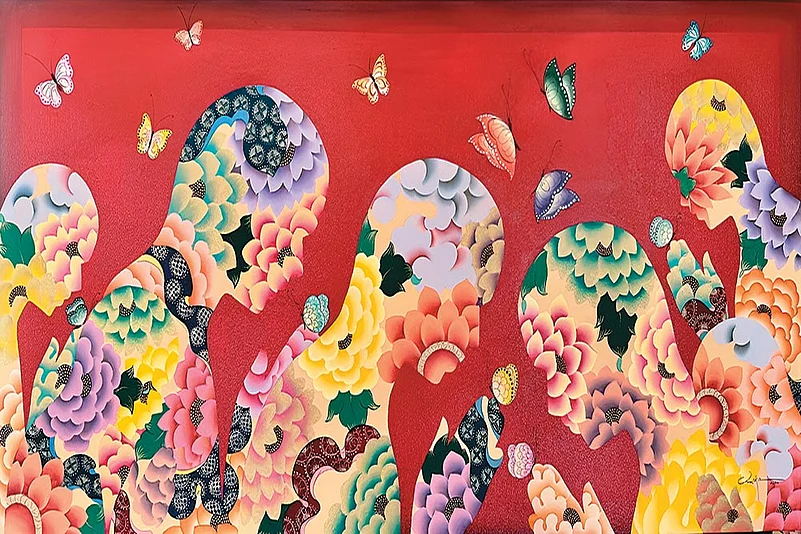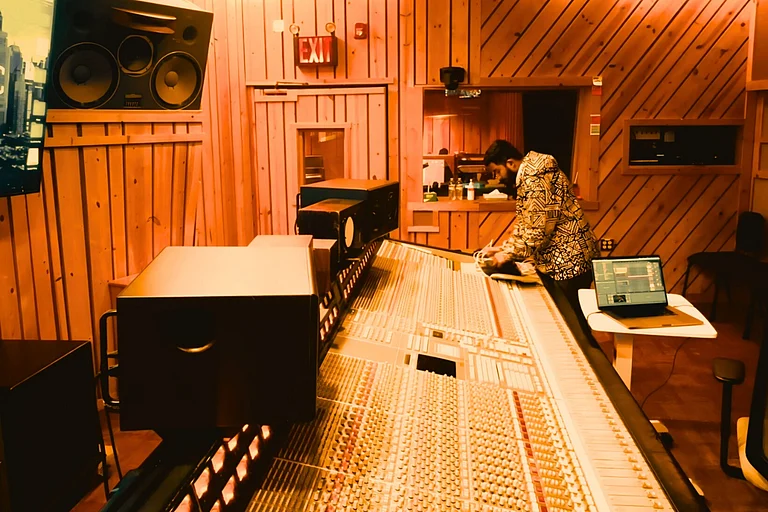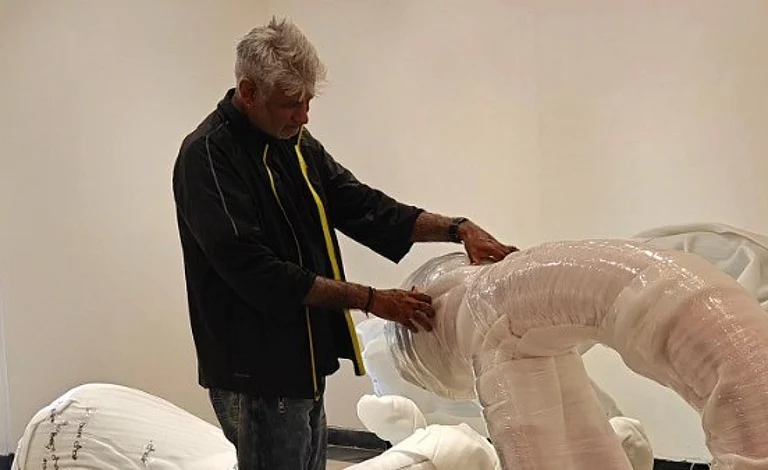I should like it known here, right here, at the beginning of this piece, that I am telling you about what happens inside me when I discover a well-loved artist has done something terrible. I am not saying that this is what you should be thinking or doing. I am all for personal freedom in all matters and with the arts, the only thing that matters is freedom. We cannot be made to love what we do not love; we resist strongly. In Dil Chahta Hai (Farhan Akhtar, 2001), Akash (Aamir Khan) and Shalini (Preity Zinta) go to the opera and he yawns. Opera, the film wanted to say, is not for everybody. Two rows down, perhaps a viewer was swept up by the music and was having a transcendental experience. Two rows ahead, another viewer was listening with his mind, picking holes in the exposition of an aria. But that yawn was funny, it was smart, because it said: Akash Malhotra is free to dislike this art form because it does not speak to him and he is not burdened by the notion that appreciating opera is a sign of cultural sophistication.
This is what we struggle with, all of us, who have any relationship with the arts. Perhaps it begins with some kind of pretension: we want to be known as people who appreciate art, we want to be known as connoisseurs, aficionados. We walk in the footsteps of others, reading Coomaraswamy and Gombrich for art, or Leavis and Barthes for literature, and we go into museums or bookshops ready to adore T’ang pottery or Proust. Sometimes we are shocked into stillness, into a dazed appreciation of something much larger than our experience. Sometimes we are surprised: This? This is what the fuss is about?
Those of us who persevere, eventually seek to decolonize our minds. We want to be free to love what we love and to walk past what we do not respond to because we want to be ourselves; certainly we will never be as learned as B N Goswamy or Shanta Gokhale but we want to be ourselves so much, we want to dispense with their guidance which we sought so eagerly at the beginnings of our journey. Hence, we laugh when Akash yawns because we too have suppressed yawns at the art forms to which an older generation subjected us. Do you remember Subhadra (Supriya Pathak) squirming through a classical dance performance in Kalyug (Shyam Benegal, 1981) and then grooving at a disco? Same-same.

So Nobel Laureate Alice Munro, Canadian maestra of the short story, author of such luminous stories as ‘Dance of the Happy Shades’ and ‘Queenie’, was unwilling to intervene when her daughter told her that she was being sexually assaulted by her stepfather. There’s more. Ms Munro stayed with the man. Ms Munro put the possibility of the man’s suicide above the demands of natural justice, the duty every parent owes their child, the debt we all owe the vulnerable, the debt we refuse to pay again and again, every time we scroll past a crying child in Gaza.
My heart goes out to that child and to the woman she grew into. She has had to live with this terrible thing that happened to her and more with the refusal of her mother to do something about it. This must have been a betrayal as deeply felt as the acts committed upon her young body. I was about to write. “All right-thinking persons must…” when I stepped back from the brink of telling you what to do and think and feel. And this was what I told myself I would not do when I was asked to write this piece. I do not know what you should do. I do not want to make your ethical choices for you.
So here’s the central question. Can we value the art without sitting in judgement on the artist? I remember being spellbound by Nanette by Hannah Gadsby; it’s still on Netflix, catch it if you haven’t seen it yet.
It’s a wild piece taking in how she was molested as a child, attacked as a woman. It’s on my list of all-time great stand-up pieces but I mention it here because one of the great take-downs Gadsby does is of the male art canon. I laughed at the sarcasm she aimed at all those women who have one breast hanging out for inspection by the public. Another take-down was Picasso and his comment about Marie-Therese Walter being the perfect age—she was seventeen, he was in her forties and they entered into a relationship. Also noteworthy: the age of consent in France at the time was thirteen so if you’re thinking statutory rape, no, it was not. If you’re thinking: that is wrong, I even agree but I am not sure whether there is ageism involved in my response, whether I am denying Marie-Therese agency, whether it wasn’t just something that made the two of them happy for a while which is about as much as anyone can expect from a relationship.
I pick up books at independent bookshops or on the streets. I begin to read. If something speaks to me, i buy the book and read it. I do not ask for certificates of morality.
But here’s the thing: Picasso was not a saint. He was a serial womanizer. He made many women unhappy. But when I see a painting by him on a wall, I am struck by the energy of it, I find myself hurrying across the room, I find myself wanting to get intimate with the painting. I think of many images of women by Picasso and each time, I am struck by the intensity of the attention, the great desire to understand, the Beckettian admission of failure, and the desire to try again. It enriches my world. I don’t want to lose it.
He is flawed. I accept that because I am flawed. I accept his art as coming from a flawed source because there are only flawed sources. Art without a human source is the sad, strange illustrations thrown up by Artificial Plagiarism, the name by which Artificial Intelligence now plumes itself.
Let me take another example. Oscar Wilde, St Oscar of the Gay Community. In 1895, Andre Gide and Alfred ‘Bosie’ Douglas and Oscar Wilde went to Algiers. There Oscar procured a street boy for Andre. He himself liked them young. Wilde was, in other words, a paedophile. He was also reviled for his sexuality. I read the transcript of the proceedings but nowhere did the age of the boys that Wilde slept with seem to matter. What mattered was that he slept with them as with a woman and that was what was wrong.
We see things somewhat differently now. It isn’t important that he slept with men. Even the Indian government in its most right-wing avatar did not interfere with the Supreme Court verdict that finally decriminalized homosexuality. But we think children should be protected from sexual predators. I agree here too. And yet when I read a particularly well-turned aperçu and find that it was written by Oscar Wilde, I do not berate myself for enjoying it. I acknowledge the flaws in its source because there will always be flaws in every human source, and I go on.
I am on the Board of Studies for English Literature for a prestigious women’s college in Mumbai. I am the token male presence. I am used to this, being the token male on the SPARROW (Sound and Picture Archives of Research on Women, sparrowonline.org). We were having a discussion and I suggested that the students might benefit from Chimamanda Ngozi Adichie’s ‘The Danger of a Single Story’. That this is also available in video format, I thought, might help the reading-averse students. You might want to ask: what are reading averse students doing in an English Literature course? Don’t be silly. You don’t think we have to like what we study, do you? We have to study it because.
That was when the youngest member of the board said, “She’s a TERF.”
I knew what a TERF was, of course. I do not live under a rock. I live in the bright sunlight of the internet: a Trans-Exclusionary Radical Feminist. This is a sin. And sinners cannot be allowed on syllabi.
At least, the sinners we define as sinners, these days.
I held my peace because I was the token man on the board. I expected discussion but we simply moved on. Chimamanda did not make it to the syllabus. Did a single story win? I don’t know.
I know how I encounter art. I pick up books at independent bookshops or on the streets. I begin to read. If I like what I read, if something begins to speak to me, I buy the book and read it. I do not ask for certificates of morality. If I walk through an art gallery, I do not ask what the political affiliations of the painters are. It is so reassuring though that the right-wingers are generally the bad ones or is that just the result of my reading and the dominance of the left-wingers on my shelves? I don’t know.
We make a negotiation with art. We make a negotiation with morality and ethics. We are changing constantly, with the sins of yesterday being the stigmata of today.
That’s where I stand. And where you stand is where you stand. I can’t ask to be free and not give you the right to be free too.
(Views expressed are personal)
(This appeared in the print as 'Human, All Too Human')
MORE FROM THIS ISSUE
Jerry Pinto is the author of Em and the Big Hoom, Murder in Mahim and The Education of Yuri












.jpg?auto=format%2Ccompress&fit=max&format=webp&w=768&dpr=1.0)




















